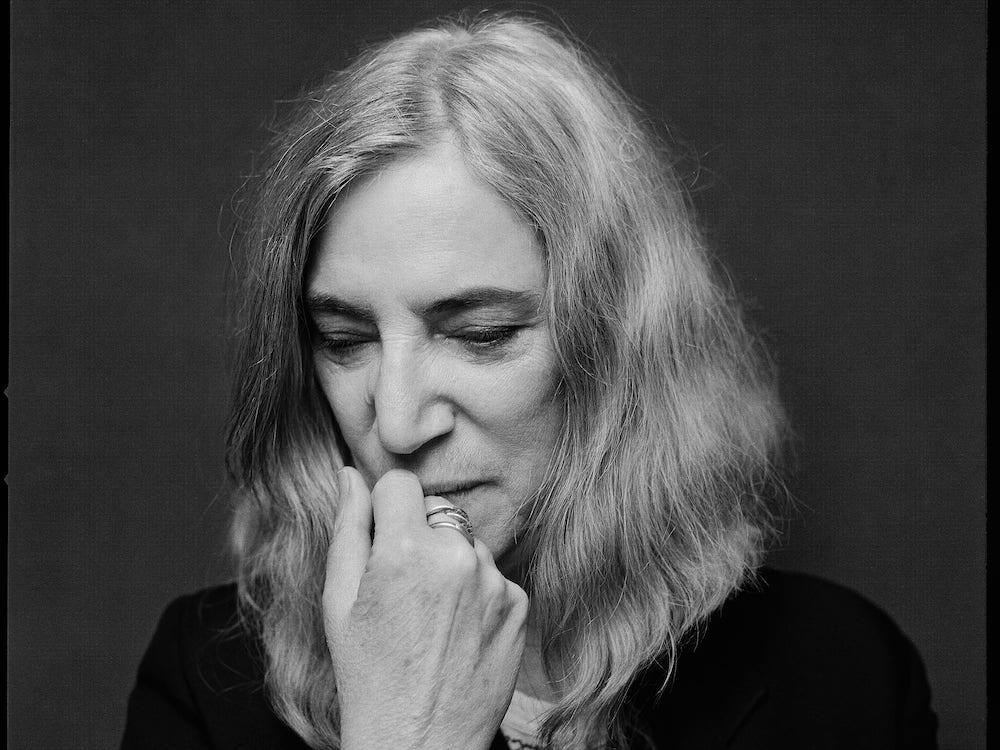In her latest memoir, Year of the Monkey, Patti Smith writes of Sandy Pearlman: “We stood on either side of him, promising to mentally hold onto him, keep an open channel, ready to intercept and accept any signal.” It’s the start of 2016, and Smith’s friend Pearlman—a producer and rock critic—has been hospitalized after a brain hemorrhage. As he lies in a coma, Smith recounts the tumultuous year that follows—the loss of friends (Sam Shepard is nearly bedridden), the horror of the imminent election and rise of nationalism, and the impending climate crisis. A reflection on mortality, the book retains Smith’s characteristically direct, flat tone as she wanders through stretches of Arizona, California, Virginia, and Kentucky, stopping at diners for black coffee and onion omelets and conversations with strangers. She hitchhikes from San Francisco to San Diego and back, travels as far as Lisbon, and returns homes to the quiet of her Rockaway bungalow to stare at the flowers. All the while, she describes the mundane details of life with incredible vividness: the contents of her suitcase (six Electric Lady T-shirts, six pairs of underwear, herbal cough remedies), how it feels to fall asleep in her coat, chatty Cammy with her truck of pickles. Smith moves smoothly between the present, memory, and magic, urging us to ask, Is there really a difference? —Camille Jacobson
I deeply love Bill Frisell: his slowish solos, the weird, nostalgic, liquid tone of his guitar. His penchant for alternately sad, hopeful, and humorous melodies has always matched the climate inside my head. And while I don’t believe any artist is above criticism, I tend to listen to every new Frisell album with curiosity, openheartedness, and gratitude. Harmony, his first in a new deal with Blue Note, leans toward the song-based and Americana sides of Frisell’s sensibility, rather than the jazz side. The quartet features the vocalist Petra Haden, whose pure, clear voice closely matches Frisell’s guitar; she sings like an angel who’s a bit disappointed on behalf of us all. The two have collaborated many times before, perhaps most beautifully on Paul Motian’s final album, The Windmills of Your Mind. The other members of this group—the bassist Luke Bergman and the cellist and longtime Frisell collaborator Hank Roberts, also sing, adding a thin, vulnerable underbelly to Haden’s lines. Harmony is a melancholy, sort of rainy-day record—the wordless rise and fall of “Fifty Years,” for instance, makes me eager for my next good cry—but Frisell is an expert at this kind of feeling. It’s precious and even hopeful in his hands. He doesn’t really cover any new ground here—though he does cover a couple standards and offer some fresh takes on old gems, including a really haunting version of “Where Have All the Flowers Gone?”—but an artist doesn’t have to “make it new” to make great art; in fact, this album argues in favor of the opposite. —Craig Morgan Teicher
Patricia Lockwood has become something of a saint among certain women in media, lonely Midwestern poets, and readers of the London Review of Books. She writes straight from the amphora, and her uncanny ability to tap into the language we didn’t know we had is just one of her superpowers. Her latest for the LRB is nominally a review of Library of America’s John Updike: Novels 1959-1965, but nested within are thoughts on Trump, the internet, #MeToo, and Fleabag. It doesn’t much matter how you feel about Updike; when you read the crystal-cut opening of Lockwood’s review, you are rooting for her to nail it, regardless of who or what makes up the bullseye. “I was hired as an assassin,” she begins. “You don’t bring in a 37-year-old woman to review John Updike in the year of our Lord 2019 unless you’re hoping to see blood on the ceiling.” Reading Lockwood, I kept thinking of that infamous first line of Don DeLillo’s Underworld: “He speaks in your voice, American, and there’s a shine in his eye that’s halfway hopeful.” Yes, Lockwood speaks in your voice, American. So did Updike at his best—“the present tense works on Updike the way boutique transfusions of young blood work on billionaires”—and at our worst: “Updike, in later interviews, maintained that Rabbit would have been an Obama voter. He may have been, but we know who he would have voted for next.” But like any boy listening on the wireless at home, Lockwood, who as a younger woman loved early Updike, demands more from American heroes than capitulation to jock itch. Lockwood is a cultural savant, both fully fluent in the twenty-first century and with a child’s awe of it. Here is both a look at a cultural critic at the height of her powers (or at least the ascent) and a glimpse of a kindergarten class gazing up at a statue in a corridor, wondering what on earth that man did to get turned to stone. —Julia Berick
Upon leaving the Angelika Film Center last night, I found my senses suspiciously heightened. My mind was quiet, but the world was not, and I felt the hum of every passing sound in my ears—women chatting in Russian, a busker gulping water before returning to his trumpet. Everyone around me seemed soft and full of light, wrapped in fall clothing they had just pulled out of storage. I don’t often feel this way, but such is the effect of Pedro Almodóvar’s Pain and Glory. It features Antonio Banderas as an older filmmaker whose physical and emotional maladies are described at one point in a delightfully mod sequence of illustrations. The film is a light and beautiful look at memory, at pain and what makes it tolerable, what it means to care for another or be reunited with someone from your past. But what heightened my senses most were the film’s glorious details. Title cards backed by patterns like swirling Hermès scarves. A dark-green leather jacket. The sound of water splashing onto tile. Almodóvar makes it possible to attend to these details, to take delight in the world, even as it weighs upon us. —Noor Qasim
As a documentary, Where’s My Roy Cohn? strikes too few notes—but the one chord of Cohn’s life, played over and over, is utterly transfixing. At twenty-three, Cohn was the prosecution in the trial of the suspected Communist spies Julius and Ethel Rosenberg, and he succeeded in launching his legal career on their conviction and execution; more than three decades later, he would reflect on that trial during a 60 Minutes interview by saying, “If I could’ve pulled the switch, I’d have done it myself.” The film presents every sound bite and action of his life in between, from the McCarthy trials to his mentoring of Donald Trump and the election of Ronald Reagan, until Cohn’s eventual death from complications related to AIDS (he would maintain until the end that he had cancer). At every revelation of corruption and each interview clip (when asked what he would have done about Watergate, Cohn shrugs, smirks, and blithely says that to solve that problem, he’d “destroy the tapes”), I’d turn to the person with me, and we’d let out a laugh, eyes wide in a kind of delighted shock. There is something both perverse and delicious in the experience of spending time with this man hell-bent on achieving … what, exactly? The documentary never floats a thesis or suggestion. Yet our fascination is there, eager to be indulged. Why do we get so much out of ogling, like children at a sideshow, a man who scorns moral concern? Cohn’s New York manse is located on East Sixty-Ninth Street; after the movie, we took the train uptown and stood on the empty sidewalk across from the towering home, staring up at its dark windows. —Lauren Kane

Roy Cohn. Photo: Herman Hiller for the New York World-Telegram and Sun. Public domain, via Wikimedia Commons.
from The Paris Review https://ift.tt/2OEnnjF


Comments
Post a Comment